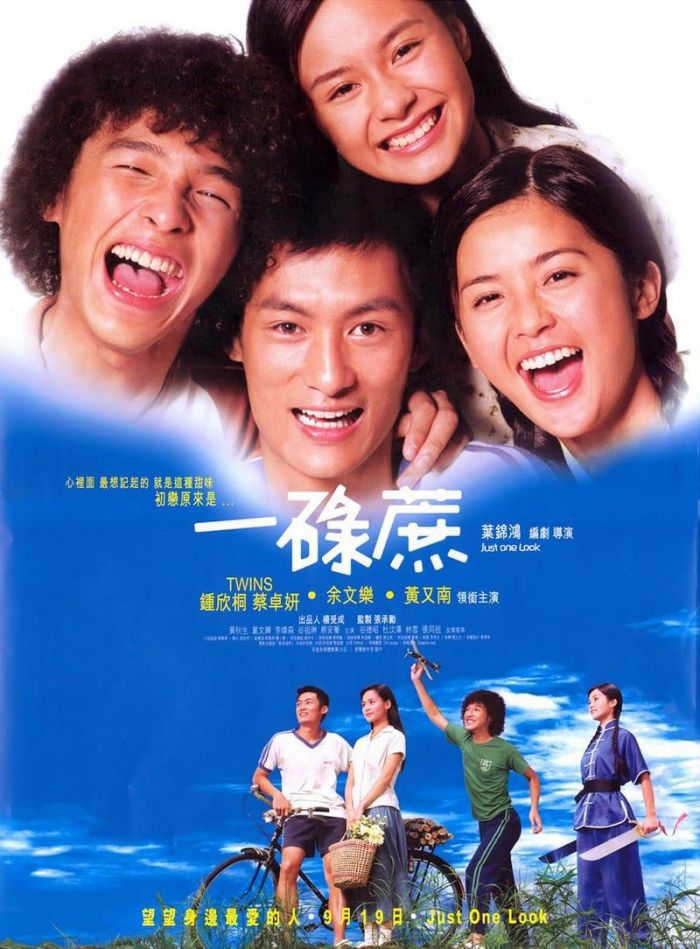Just One Look by Yip Kam-Hung (Review)

It’s fairly safe to say that when it comes to Hong Kong cinema, the country’s action films get all of the glory, and for obvious reasons. While HK cinema in general has been lagging over the past decade or so, there’s absolutely nothing like HK cinema in its prime, especially the action titles, be they classic Jackie Chan and Jet Li martial arts, or John Woo and Ringo Lam actioners. However, that unfairly ignores a lot of great HK films that have fallen through the cracks, films that are usually overlooked due to the simple fact that they don’t feature a heavy dose of flying fists and blazing .45s.
Such is the case of Yip Kam-Hung’s Just One Look. On its surface your typical pop star-studded teen romantic comedy, Just One Look is, at its core, a gently nostalgic and bittersweet look at the Asian films of yore, and the way that they shape the memories and actions of their viewers. In this regard, Just One Look bears a passing resemblance to Giuseppe Tornatore’s Cinema Paradiso, which also dealt with the ways that films shape and mold its characters’ lives. But it’s safe to say that Yip’s film is considerably more wacky and lighthearted.
Just One Look primarily concerns itself with two best friends, Fan (Shawn Yue) and “Fishball” Ming (Wong Yau-Nam). Like most teenage boys, they spend their days raising hell around their sleepy island town, getting into scuffles with the other local gangs, fantasizing about women and ogling underwear, and of course, sloughing off their jobs selling snacks at the local movie theatre to go inside and get lost in countless kung-fu epics, hard-boiled crime dramas, and sappy romances.
It was in this movie theatre that Fan’s father (Sam Lee) committed suicide when he was seven years old. Unable to accept the fact that his father, a decorated cop, could’ve killed himself, Fan becomes obsessed with avenging his father’s death. The target of his revenge is Crazy (Anthony Wong), a local gangster who constantly harassed Fan’s father over his debts, and who now demands protection money from Fan’s sugar cane stall. Unfortunately, Fan knows there’s no way he can directly attack Crazy, so he settles for pegging him with his slingshot every chance he can get.
Hoping to deal with Crazy once and for all, and perhaps inspired by one too many Shaw Brothers movies, Fan and Ming enroll at the local martial arts school, where they both fall for the instructor’s daughter Nam (Charlene Choi). But soon, Fan becomes infatuated with another girl (Gillian Chung) who lives in a nearby nunnery. Forbidden to see her because of her living arrangements, Fan resolves to write her letters. Unfortunately, he’s no good at it, so he begins digging through all of the movies played at the theatre, using plots and lines of dialogue to communicate his feelings.
It sounds all cloying and saccharine, and at times Just One Look does become pretty sappy, especially during the musical montages involving Chung’s character going through Fan’s latest love note (and set to an Asian pop rendition of The Bee Gees’ “Melody Fair”). But what ultimately rescues the film is playful yet melancholy sense of nostalgia that permeates every single frame.
Nearly everything that happens in the film, from Ming’s screwball antics to the romantic triangle between Fan, Nam, and Chung’s character to the final showdown between Fan and Crazy, is rather predictable. But it moves with such a light, deft touch that it’s never anything less than enjoyable. And fans of classic HK cinema will get a kick out of the constant homages and parodies that litter the film.
At times, the film is pretty hilarious. The running gag of Fan attacking Crazy with a slingshot never grows old, due in large part to Wong’s comedic skills. Another running gag involves Fan and Ming’s martial arts instructor, who constantly harangues his students for watching too many kung fu movies even though he seems to know a bit too much about the latest releases. Since the film’s main characters are two teenage boys, there’s naturally some lowbrow humor to be found, either in their attempts to electrocute rats by peeing on them or their discussions of love and erections (though American Pie this ain’t).
It also must be noted that the film is surprisingly well-acted, especially considering the number of teen idols present. Shawn Yue is sometimes a bit too stolid and wooden, but he’s easily offset by Wong Yau-Nam’s energy. And while the presence of Charlene Choi and Gillian Chung (better known as the pop dynamo Twins) in a movie is usually enough to cause one to break out in a cold sweat, they’re surprisingly understated here. Choi has some fine scenes as she attempts to confess her feelings to Fan, and Chung is suitably enigmatic. However, the real joy here is veteran actor Anthony Wong.
At first, Crazy seems like your typical loud-mouthed gangster, all full of himself and constantly threatening to cut off people’s balls. But as the film progresses, and his showdown with Fan becomes increasingly inevitable, we see a few chinks in Crazy’s brash exterior, which sets up a rather poignant ending. The ending is one of the more interesting aspects of the film, a bittersweet coda that ends the film on one last flight of fancy even as it firmly grounds it in reality, reminding us that some things can, and perhaps should, only exist in the movies.